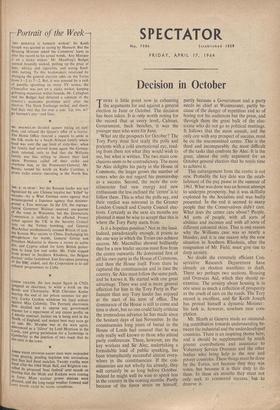Decision in October
THERE is little point now in exhuming the arguments for and against a general election in June or October. The decision has been taken. It is only worth noting for the record that at every level, Cabinet, Government, back benches, it was the younger men who were f6r June.
What are the prospects for October? The Tory Party must first study the polls and portents with a cold unemotional eye, read- ing from them not what they would wish to see, but what is written. The two main con- clusions seem to be contradictory. The more Sir Alec delights his party in the House of Commons, the larger grows the number of voters who do not regard his premiership as a success. Second, the more the con- stituencies find new energy and new enthusiasm the less inclined the 'centre' is to follow them. This is what the polls say, and their verdict was mirrored in the Greater London Council and County Council elec- tions. Certainly as the next six months are planned it must be wise to accept that this is where the Tory Party starts from.
Is it a hopeless position? Not in the least. Indeed, paradoxically enough, it points to the one way in which the Tories can achieve success. Mr. Macmillan showed brilliantly that for a new leader success must flow from the centre outwards. He dominated first of all his own party in the House of Commons, and then the House itself. From there he captured the constituencies and in time the country. Sir Alec must follow the same path, and he knows it. He started with one great advantage. There was and is more general affection for him in the Tory Party in Par- liament than any Tory leader' has enjoyed at the start of , his term of office. The dominance of the House is still to come and time is short, but no one could fairly criticise the tremendous advance he has made since the hesitant days of last November. In the constituencies long years of burial in the House of Lords had ensured that he was only really well known to those who attend party conferences. Thes6, however, are the key workers and Sir Alec, undertaking a formidable load of public speaking, has been triumphantly successful almost every- where in the constituencies. If the con- stituencies are not wholly his already, they will certainly be so long before October. Indeed he might well be wise to speak less in the country in the coming months. Partly because of the fierce strain on himself, partly because a Government and a party needs its chief at Westminster, partly be- cause of the danger of repetition and so of boring not his audiences but the press, and through them the great bulk of the elec- torate who do not go to political meetings. It follows that the main assault, and the only one with any prospect of success, must be on the uncommitted centre. This is the third and incomparably the most difficult of the tasks that confront Sir Alec. It is the great, almost the only argument for an October general election that he needs time to achieve it.
This estrangement from the centre is not new. Probably the key date was the estab- lishment of the pay pause in the summer of 1961. What was done was an honest attempt to underpin prosperity, but it was skilfully exploited by the Socialists and was badly presented. In the end it seemed to many people that the Conservatives didn't care. What does the centre care about? People. All sorts of people, with all sorts of abilities and incomes and with all! sorts of different coloured skins. That is one reason why the Williams case was so nearly a blunder, and it is one reason why the new situation in Southern Rhodesia, after the resignation of Mr. Field, must give rise to deep anxiety.
No doubt the extremely efficient Con- servative Research Department have already an election manifesto in draft. There are perhaps two sections, Housing and Overseas Aid, which they should re- examine. The anxiety about housing is in one sense as much a reflection of prosperity as the crush of cars on the roads. The Tory record is excellent, and Sir Keith Joseph has proved himself a dynamic Minister : his task is, however, nowhere near com- pletion.
Mr. Heath at Geneva made an outstand- ing contribution towards understanding be- tween the industrial and the underdeveloped countries. There is an inspiring theme here, and it should be supplemented by much greater contributions and assistance to Voluntary Service Overseas and the other bodies who bring help to the new and poorer countries. These things must be done by the Tories, not because they may win votes, but because it is their duty to do them. In these six months they must not only seek to command success,' but to deserve it. •


































 Previous page
Previous page